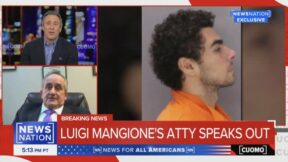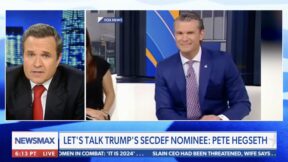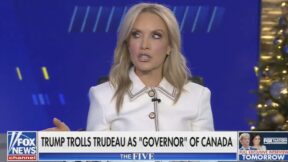Jen Psaki And MSNBC Legal Experts Torpedo ‘Cockamamie’ New Trump Filings In Criminal Trial
MSNBC host and ex-Biden press secretary Jen Psaki led legal experts in a roast of new “cockamamie” filings from former President Donald Trump and his legal team in the federal Espionage Act trial.
After Trump-appointed Judge Aileen Cannon denied efforts to delay the Espionage Act trial last week, Trump’s legal team filed a stack of motions demanding the dismissal of the case on grounds that most experts find flimsy, at best.
On Sunday’s edition of MSNBC’s Inside With Jen Psaki, Psaki called in her in-house “Law Firm” of MSNBC legal analysts Neal Katyal and Andrew Weissman to go through the “crazy” arguments in the new batch:
JEN PSAKI, MSNBC HOST: Of all the cockamamie legal arguments that Trump and his lawyers have made, few were crazier than what we have heard this week. In an effort to get his classified documents case dismissed, Trump is now claiming that the records that he retained from the White House were actually designated as his personal property. That’s not how it works, by the way.
And according to Trump, they belong to him simply because he removed them from the White House. He just takes the records and, presto chango, he owns them.
Here’s the kicker: because Trump was still president when he took those records, he claims he is entitled to presidential immunity, and therefore can’t be prosecuted for retaining them.
Of course, this claim of sweeping immunity is nothing new. It’s the same argument he made in the federal election case. And it could soon be settled by the Supreme Court.
…I’m not a lawyer, as we all know. I have dealt with classified documents, however, and these arguments do seem pretty farfetched, it’s not exactly how it works. Even if Trump was allowed to take whatever he wanted, he was charged with illegally retaining those documents, even after they were subpoenaed.
So, how does this help his case? I assume it does not. But break it all down for us.
NEAL KATYAL, MSNBC LEGAL ANALYST: Yeah, it doesn’t. And I think the first thing to note is just the relationship between this discussion and the one you were just having with Sarah Matthews because Ms. Matthews said that Trump’s policies are antithetical to the rule of law and democracy. And here, he’s doing the same thing. He’s saying, I’m immune and I’m going to delay all of these cases against me, so that I don’t have to face the wheels of justice.
Again, it’s all about just being antithetical to the rule of law and democracy. And so, here, his claim is, you know, look, I’m immune while I’m president, even though that was flatly rejected by our nation’s second highest court just a couple of weeks ago. And as you point out, it doesn’t matter because he is charged with retaining the documents after he was president. So, it’s not about his presidential duties.
And it connects up to the overall problem with Trump, which is always a “heads I win, tails you lose” theory of presidential accountability. When he was president, he said, I can’t be indicted because I’m a sitting president. You can only impeach me. He was then impeached.
And then he says, you can’t impeach me. You can only indict me after I leave office. He’s then indicted after he leaves office and he says, you can’t indict me because I was never impeached. I mean, it’s all just a shell game.
PSAKI: It makes your head spin.
So, Andrew, there’s a lot of immunity claims being thrown out there as Neal was just alluding to. I mean, the Supreme Court is — this comes as the Supreme Court weighs whether to take up Trump’s first claim of immunity in the federal election case. And as we’ve discussed, I know you’ve pointed out, if they even take up the case, it will delay the federal election case.
So, how does this claim, or does it, impact their decision or consideration about whether or not to take the case?
ANDREW WEISSMANN, MSNBC LEGAL ANALYST: Well, from Donald Trump’s perspective, there’s sort of no downside in doing this, because at the very least, he’s throwing sand in the gears in connection with a Florida case. The motion as you and Neal have discussed are frivolous, but that doesn’t mean that it won’t give the excuse for Judge Cannon to continue to delay the case, which he so far has grabbed onto every single one of those.
With respect to the Supreme Court, they’re not directly related, but, you know, again, I can’t imagine that Trump’s lawyers are thinking, no downside if the court sees that there’s a second claim for immunity at a very different context after he is president, and you think you wouldn’t be able to make that claim. But that means that this — this will be litigated in a different circuit. The cases before them is in the D.C. circuit.
PSAKI: Uh-huh.
WEISSMANN: So, now, you have another case. There could be some justices who are going to grab on to that as a reason to take a case. So, you know, that’s I think something that if you’re Donald Trump’s lawyers probably was in the back of their mind. I’m not sure it’ll succeed, but they get no downside for them to make this argument.
PSAKI: It’s all a little maddening.
Okay. Neil, I mean, just — we’re just rolling around through all the cases. Aileen Cannon I think is fair to say has been unusually sympathetic to Trump in the documents case. These new claims from Trump, though, just to go back to that case, they seem like still a bridge too far. I know it’s hard to predict what a judge will do, but what — how do you think she will be looking at this?
KATYAL: Well, I think any fair-minded judge would take these claims and throw them out pretty much right away. I mean, in addition to the immunity claim, we’re just talking about is a claim that the special counsel is unconstitutional, presidents of both parties, George W. Bush and others have used these exact regulations and have found no constitutional defects. I think those claims are weak, as well as the other ones.
And, you know, this is a judge who’s been rebuked twice by the court of appeals in her very conservative circuit for going out and bending over backwards to try to protect Donald Trump.
So, my hope is that, you know, she’s learned her lesson. We will find out maybe as early as Friday whether she’ll keep that May 20th trial date, extend it, how long she’ll extend it.
Obviously, there’s a concern if she extends it past the election that Donald Trump wins and will nullify this prosecution, order it dropped, and then, of course, no accountability for him, for what are very serious crimes, and, you know, any government official of any party who did anything like this it would’ve been indicted by now, would be indicted, and indeed convicted by now.
Watch above via MSNBC’s Inside With Jen Psaki.






